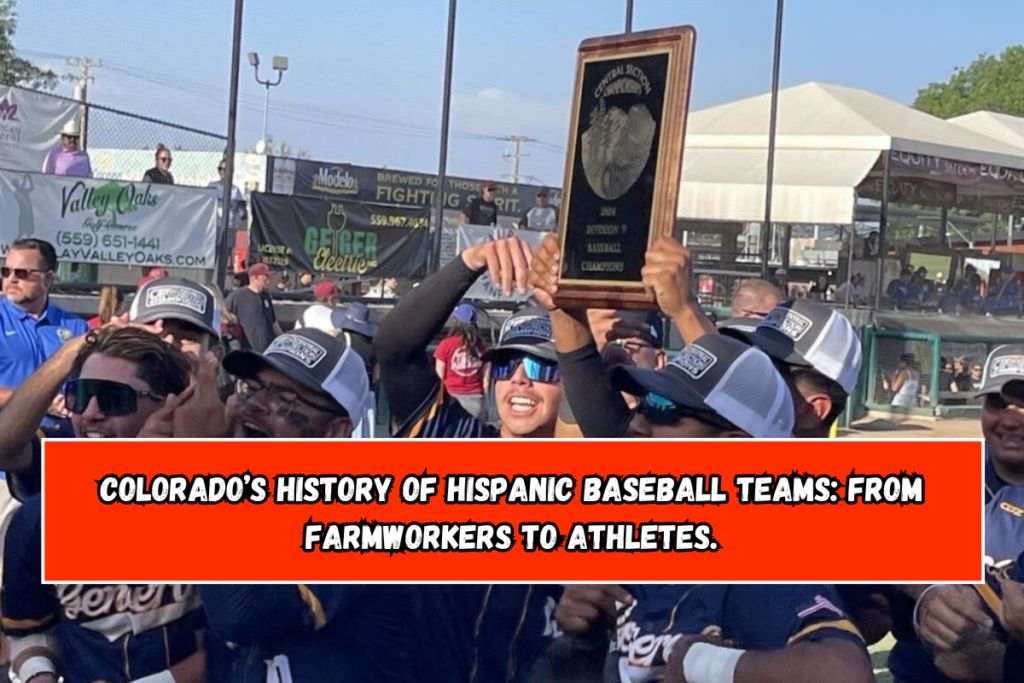“America’s favorite pastime” may not be as popular as it used to be, but baseball has a long history in Hispanic neighborhoods in northern Colorado, so those happy memories will live on.
Farmworkers from the southwest began coming north to Colorado more than a hundred years ago to take care of crops like sugar beets, potatoes, and cherries. In the end, companies like the Great Western Sugar Company gave their workers tools and space to build neighborhoods called colonias.
A person who grew up with baseball said, “Baseball was a Sunday afternoon treat for the Mexican people.”
At first, they played baseball on old beet fields that had been cleared of weeds. If the ball went over the fence, you hit a home run.
“That was rough to play there,” Suniga said. “If you chased the ball out there, it would be full of thorns by the time you got it.”
He told them, “You got what you got” when it came to gear. He talked about gloves that didn’t have padding and catcher’s gear that only had a few thin wires to cover your face.
Suniga said that he often faced racism off the baseball field as a child. He remembers that as he walked down the street, kids would swing at him. “No Mexicans, dogs, or Indians” was written on the sign outside the grocery shop.
They made their own baseball teams in each town, and almost all of the players were Hispanic. Friendly rivalries gave them a way to let off steam.
“It was really tough,” Suniga said. “Everyone was aiming at someone, especially if they were below par.”
Still, baseball brought people together. Suniga remembers that the streets were lined with cars and that families would stay to watch the games for hours on end.
He said, “You can’t believe how much help these people had.”
They organized the teams into a league that was known as semi-professional because of their raw skill and love for the game.
The leader’s father, Lee “Trigger” Suniga, was one of them.
Suniga said, “My dad was a great baseball player.” He ran the Fort Collins Legionnaires team and was president of the Rocky Mountain Baseball League. He also played on the team.
Suniga Street in Fort Collins is named after him to honor his work.
She said, “I thought he was one of the best outfielders I’d ever seen.” “When it came to baseball, he was the rock of Fort Collins.”
“Trigger” even took the first Hispanic baseball team to play against criminals at Canon City State Penitentiary.
“baseball helped out a lot of these people in these towns” during its peak years, from the 1920s to the 1960s. Most of all, “I had a great time.”
Some of these Hispanic teams have been changed over the years. For example, the Greeley Grays are now a college team.
There was a moving show at the Greeley History Museum that brought stories and items from the sport to town. Gabe and Jody Lopez wrote the book From Sugar to Diamonds:
Spanish/Mexican Baseball 1925–1969 and has a lot of the photos, outfits, bats, balls, and oral histories that are in it. It’s called ¡Pleibol! In the Barrios and the Big Leagues, and the Smithsonian is taking it all over the country.
Gilbert Salazar, who stopped by with family from California, said, “This is just amazing when I look at the trophies and the old uniforms.”
He said, “I was the batboy there.” “I remember when my dad coached my uncles.” Now he’s a coach for a team in his area.
“The Mexicano leagues around here now have leagues,” he said. “They also have some great players these days.”
People in Colorado who are making a difference | Denver7 featured videos It was said that a former Littleton school bus driver abused kids with autism. The worker now pleads not guilty. Take Liam’s ride: One year after a teen cyclist killed someone at St.
Anthony Hospital in Littleton, West Metro Fire Rescue held a mass casualty event drill to call for change. Three big lies: Fighting back against false information about the election in Colorado Watch this video to see inside the first trippy church in Colorado.


